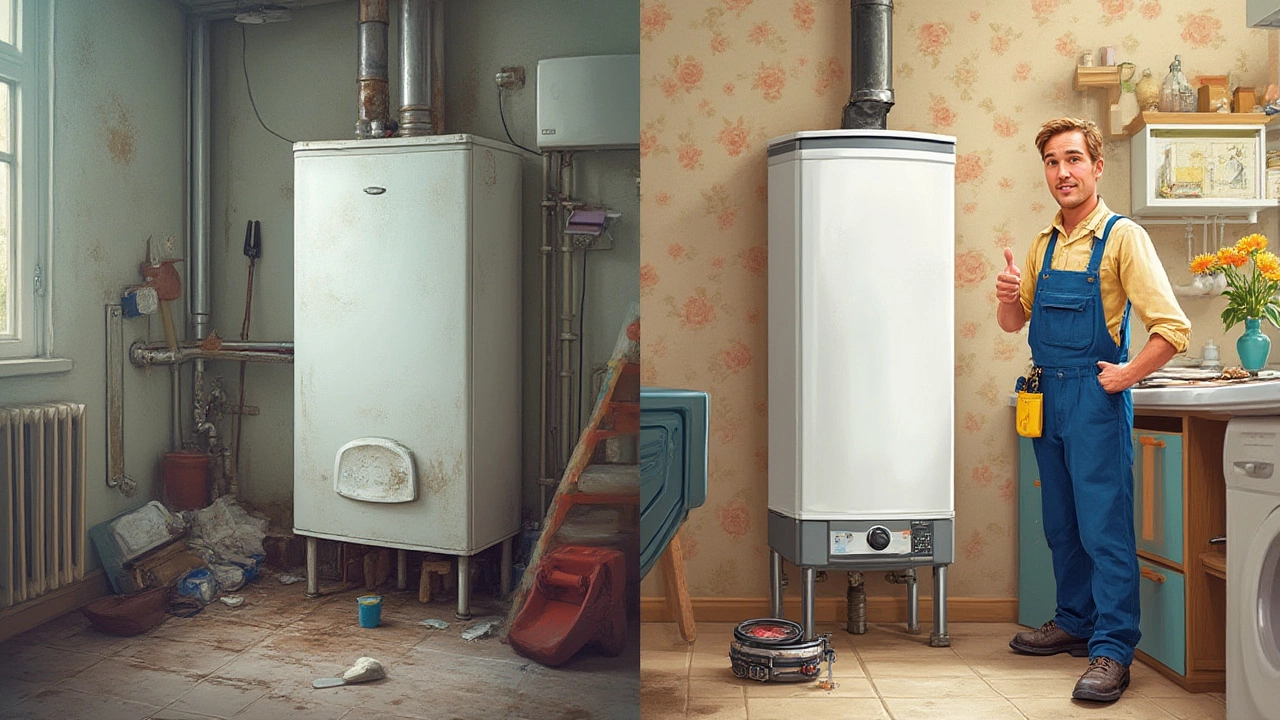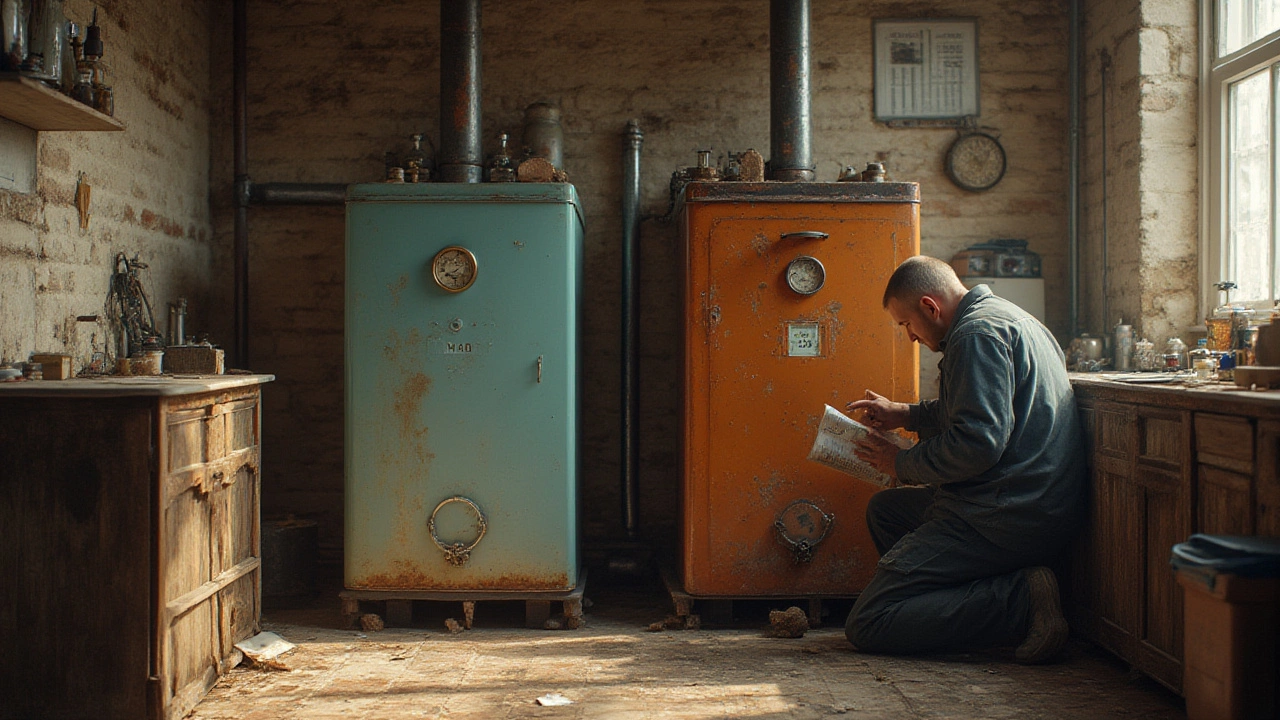You pay the gas, you hear the clunks, and you expect hot water—until your boiler starts acting weird. Suddenly, you're asking: how long can this thing keep going before it gives out? Not all boilers are created equal, and not all live equally long. The average person doesn't pin a calendar on their boiler, counting down to disaster. Most boilers soldier on in the background, out of sight and, honestly, out of mind—until something breaks.
Average Lifespan: The Truth Behind the Numbers
Let’s get straight to it: the average lifespan for modern boilers sits somewhere between 10 and 15 years. Go back a couple generations and some of those big, boxy monsters lasted 20 years or more, but don’t fall for the myth that your shiny new boiler is indestructible. They don’t build them like they used to, and for a good reason—efficiency standards have changed, and so have the guts inside the machine.
The biggest factor? Maintenance. According to the UK’s Energy Saving Trust, modern condensing boilers can run efficiently for about 15 years if you maintain them well. A well-kept boiler will outlast one that sits neglected, gathering dust and corrosion. Think oil changes for cars, but cheaper and less sticky. In my own house, Rowan grew up with a combi boiler that performed heroically for 13 years—regularly serviced, descaled twice, and never once ignored. On the flip side, my neighbor’s four-year-old boiler died a quick death after years of skipped checkups and DIY fiddling gone wrong. That’s not rare—it’s plumbing karma.
So, what else chips away at a boiler’s time on this earth? Water quality matters a ton. Hard water, loaded with minerals, leads to limescale buildup—those thick, crusty deposits that gum up critical parts. Limescale is one of the top boiler killers in places like London or Birmingham. That’s why some homes need special filters (or at least a regular descaling). Over-pressurization is another silent killer. When your pressure gauge is always straining at the red, the insides—the pump, the valves—just wear out much faster.
The type of boiler matters too. Regular or "heat-only" boilers tend to last the longest because they’ve got fewer moving parts. Combi boilers are popular because they’re compact and supply instant hot water, but because they’re used more (hot water on demand), they put extra mileage on their components. System boilers split the difference, especially in bigger homes, but age about the same—expect 12 to 15 years with proper TLC.
Don’t forget about manufacturer quality. Go cheap and you’ll probably get a short-lived unit. Brands like Worcester Bosch, Vaillant, and Viessmann generally outperform budget brands (and their warranties reflect this). Check a table like this for a quick comparison:
| Boiler Brand | Average Lifespan (years) | Warranty (years) |
|---|---|---|
| Worcester Bosch | 12-15 | 10 |
| Vaillant | 12-15 | 7 |
| Ideal | 10-12 | 7 |
| Glow Worm | 8-12 | 5 |
| Baxi | 10-14 | 7 |
Even with these numbers, don’t expect miracles. The best brand can’t outpace relentless neglect or a house with really poor water quality. Regular service is the best insurance policy you can get.
Causes of Boiler Failure: Why Don’t They Last Forever?
So what actually knocks a boiler out of the running? The most common culprit is internal corrosion—basically, metal parts wearing out from a blend of water, oxygen, and sometimes dodgy chemicals. Radiators with leaks or air in the system fast-track this process by letting oxygen cause rust inside, which spreads like a virus to everything the water touches.
Blockages are another disaster waiting to happen. Sludge (a grim mix of rust, dirt, and mineral deposits) builds up over years, circulating through your pipes and boiler parts. It acts like cholesterol in arteries—it restricts flow, increases pressure, and eventually blocks everything up. If your radiators have cold spots and your boiler is making weird noises, this is probably happening right now.
Wear and tear is inevitable too. The boiler’s heat exchanger (the bit that actually heats your water) faces the most abuse. Over time, metal fatigue, limescale, and microcracks start to form. When things start leaking inside the sealed chamber, replacement is basically your only option—an expensive one at that.
Then there’s the matter of electrical components. Modern boilers rely on sensors, circuit boards, and pumps to do their jobs. Unfortunately, electronics don’t have the same lifespan as cast iron. A faulty PCB (printed circuit board) or pump doesn’t always mean the boiler’s finished, but costly part after costly part is a sign that the end is near.
Sometimes, boilers are doomed by the way they’re installed. If the installer cuts corners—maybe to save time or because you hired the "cheapest bloke you could find"—you could face years of headaches. Badly fitted pipework, improper flue location, or lack of proper system flushing from day one will slowly erode your boiler's life expectancy.
Around four out of five boiler breakdowns in the UK happen in winter. That’s partly because a dormant summer season lets minor faults go unnoticed until you crank up the heat. When the system switches from dozing to double-time, those lurking problems become full-blown emergencies. An annual service in late summer or early autumn helps you dodge that unpleasant festive surprise.
Lately, some folks run their boilers extra low trying to save on bills—a sensible goal, but if the system never gets hot enough to clear out bacteria and condensation, it can wind up damaging itself. Low-use can be just as harmful as overuse, just in a sneakier way.

Maintenance and Hacks for a Longer Boiler Life
Basic boiler care isn’t something you’re taught in school, but it should be. Every year, get a pro to service the unit. Not just a quick look either—they should clean the heat exchanger, check the flue, look for leaks, test gas pressure, and bleed the system if needed. Missing the annual service could invalidate your warranty, too.
If you’re handy, watch for pressure changes on the boiler’s gauge. Most units like it between 1 and 1.5 bar. Too low, and your radiators won’t heat up right; too high, and valves can start to weep. Check for slow drips under the unit or around radiators—small leaks add up fast. If you’re in a hard water zone, use a magnetic system filter (or limescale inhibitor) to grab those nasty mineral bits before they build up. It’s a *game changer* if your house is blessed (or cursed) with heavy minerals.
Bleeding your radiators yearly (or when you feel cold spots) lets out extra air, which stops your system turning into a rusty mess. This is a five-minute fix with a small radiator key, and you hear a soft hiss as air escapes. Once water comes out, you’re done. Just check the system pressure afterward and top it up as needed.
If you’re feeling proactive, power flushing your system every 5-7 years removes the worst sludge from the pipes and radiators. It’s not a DIY job—you’ll need a tech with special gear. After a flush, you may notice you get hotter water, quieter running, and the boiler works less to heat your home.
Pay attention to noises. Gurgling, banging, or whistling that appears suddenly isn’t your boiler composing a tragic tune—it’s a warning. Usually, it’s trapped air, limescale, or a failing fan. Tackle these early. Letting them ride can cut years off the boiler’s life.
One trick—if you go on holiday, don’t switch off the boiler entirely. Let it come on for a few minutes daily to keep the pump, valves, and moving parts from seizing up. Stagnant water is the enemy.
- Annual pro servicing keeps your warranty intact
- Pressure checks and tweaks stop surprise breakdowns
- System filter catches damaging bits before they become a crisis
- Power flushes every few years make a dramatic difference
- Never ignore leaks or odd noises
Signs You Need a New Boiler (Not Just a Repair)
Every homeowner hopes to squeeze one more year from their hardworking boiler. Sometimes, that’s a big mistake. Clinging to a dying boiler leads to repeated breakdowns, rising gas bills, and, in the worst cases, puts your safety at risk (hello, failed carbon monoxide test).
Here are the unmistakable signs that your boiler is closer to the scrap heap than a comeback:
- Your boiler is 15 years old or more and needs major parts (heat exchanger, PCB, fan, pump). Repairs will cost nearly half the price of a brand-new unit.
- It’s breaking down every few months. If you called out a plumber three times in a year, the writing’s on the wall.
- It makes new and alarming noises—clanking, banging, or loud whirs—especially after being reset or refilled. It’s not just air or limescale; moving parts are wearing out.
- Hot water temperature constantly fluctuates or takes ages to get hot—classic signs of failing internal sensors or heat exchanger issues.
- Your heating bill keeps climbing, but your usage hasn’t increased. That means your boiler is losing efficiency—sometimes dropping to below 60%, compared to 90%+ for models only a few years old.
- You spot leaks under the boiler or around pipes that keep coming back, especially if the unit has rust on the connections.
- Failed safety or emissions check (flue gas analysis) during your annual service.
Even insurance companies cap the number of repairs they’ll pay for—when repairs hit a certain cost (around £300 to £400), they know it’s time for replacement over endless callouts. A new, efficient boiler can drop your monthly bills and run whisper-quiet in the background, almost making you forget it’s there. Some of the "smart" models today even self-diagnose minor faults and alert you before major disasters. That’s peace of mind money can buy.
If you crave another year with your ancient boiler, just weigh the numbers: repeated breakdowns, wasted energy, and worry about winter breakdowns add up fast. Sometimes, paying for a new boiler this year means you won’t have a freezing night (or a plumber’s overtime bill) right when you need heat the most.


